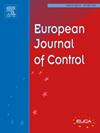The study of collision analysis and stabilized operational control for a multi-flexible space robot under captured target collision
IF 2.6
3区 计算机科学
Q2 AUTOMATION & CONTROL SYSTEMS
引用次数: 0
Abstract
As the future spacecraft develops in the direction of large-scale and lightweight, which makes the space robot components have highly flexible deformation characteristics, this deformation vibration will affect the stable operation of the space robot. Especially during target capture. The collision impact will affect the accuracy of the robot's end-effector in capturing the target, and it will also exacerbate the deformation of the flexible components, further affecting the stability control of the robot. Therefore, to solve the stabilization problem of the composite system of space robots affected by collision impacts when a flexible space robot captures a target, a multi-objective energy-optimal control combination composite control strategy based on bounded-input sliding-mode control and quantum diagonal matrix recurrent neural network control is proposed. The controller not only realizes the trajectory tracking of the robot system, but also adjusts the control parameters using the adaptive law to improve the robustness of the system. At the same time, the deformation of the flexiblelink is effectively controlled by considering the effect of energy impact after collision. Finally, the effectiveness of the controller is verified by numerical simulation. Compared with previous composite control schemes, this controller is able to control the capture of the target system by a multi-flexible space robot more effectively and improve the robustness of the control system.
捕获目标碰撞下多柔性空间机器人的碰撞分析与稳定运行控制研究
随着未来航天器向大型化、轻量化方向发展,这使得空间机器人部件具有高度柔性的变形特性,这种变形振动将影响空间机器人的稳定运行。特别是在目标捕获过程中。碰撞冲击会影响机器人末端执行器捕获目标的精度,还会加剧柔性部件的变形,进一步影响机器人的稳定性控制。因此,针对柔性空间机器人捕获目标时空间机器人复合系统受碰撞冲击影响的镇定问题,提出了一种基于有界输入滑模控制和量子对角矩阵递归神经网络控制的多目标能量最优控制组合复合控制策略。该控制器不仅实现了机器人系统的轨迹跟踪,而且利用自适应规律对控制参数进行调整,提高了系统的鲁棒性。同时,通过考虑碰撞后能量冲击的影响,有效地控制了柔性链的变形。最后,通过数值仿真验证了该控制器的有效性。与以往的复合控制方案相比,该控制器能够更有效地控制多柔性空间机器人对目标系统的捕获,提高了控制系统的鲁棒性。
本文章由计算机程序翻译,如有差异,请以英文原文为准。
求助全文
约1分钟内获得全文
求助全文
来源期刊

European Journal of Control
工程技术-自动化与控制系统
CiteScore
5.80
自引率
5.90%
发文量
131
审稿时长
1 months
期刊介绍:
The European Control Association (EUCA) has among its objectives to promote the development of the discipline. Apart from the European Control Conferences, the European Journal of Control is the Association''s main channel for the dissemination of important contributions in the field.
The aim of the Journal is to publish high quality papers on the theory and practice of control and systems engineering.
The scope of the Journal will be wide and cover all aspects of the discipline including methodologies, techniques and applications.
Research in control and systems engineering is necessary to develop new concepts and tools which enhance our understanding and improve our ability to design and implement high performance control systems. Submitted papers should stress the practical motivations and relevance of their results.
The design and implementation of a successful control system requires the use of a range of techniques:
Modelling
Robustness Analysis
Identification
Optimization
Control Law Design
Numerical analysis
Fault Detection, and so on.
 求助内容:
求助内容: 应助结果提醒方式:
应助结果提醒方式:


